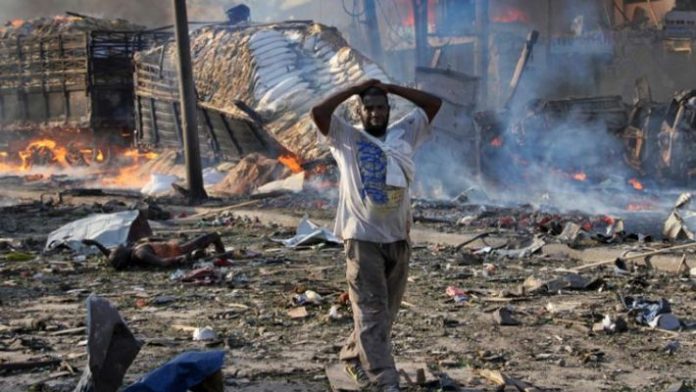Despite the horror of that attack a year ago, I’ve talked to this group, and I know that dialogue is the only way to deliver peace
Today is the one-year anniversary of one of the darkest days in Somalia’s history. On 14 October 2017, al-Shabaab suicide bombers drove a truck full of explosives into a crowded junction in the nation’s capital, Mogadishu. They killed approximately 600 people. Around 100 of those were children. The bomb scene was so large it resembled a canyon. For days, it was a crater of horror and tragedy.
There is little doubt in my mind that the perpetrators of that scene are akin to monsters. Despite this, I call for dialogue. I believe we have to compel and convince al-Shabaab to come to the political negotiating table.
I have been talking to them for years. Since 2009, members of al-Shabaab have been defecting and rejecting violence and the group’s ideology. During my time as counterterrorism advisor to the government of Somalia, I created and coordinated the country’s first and only defector programme. I managed several high-level defections from al-Shabaab, including their head of intelligence as well as dozens of soldiers. I would sit opposite them and listen to them for hours. What those defectors said in our meetings made me believe dialogue with al-Shabaab is possible.
To outsiders, al-Shabaab might sound like an unreasonable party to negotiate with, but from warlords to Islamists, successive Somali governments have always found room to accommodate opposition groups, violent and nonviolent alike.
I’ve learned three crucial things. First, we have to understand al-Shabaab. This organisation can be viewed metaphorically as a house, with a roof, pillars and a floor. The roof is the element that can be seen from miles away – al-Shabaab’s operations and its publicity campaign. But the campaign to pacify al-Shabaab cannot merely focus on that; it must also target the pillars that hold up the roof, the group’s military and finances; and also the floors of the house, primarily its rural support base and ability to influence at home and abroad. Ahead of negotiations, it will be key to assess the personalities of al-Shabaab’s current leaders, and identify what motivates them, as well establish who is open to reconciliation and who is not.
Second, we must understand what al-Shabaab wants. It does not recognise the current constitution of Somalia, describing it as not sharia-compliant. President Mohamed “Farmaajo” Mohamed has promised to deliver a new constitutional order before the next elections – and this could potentially accommodate some of al-Shabaab’s demands.
The organisation has also always insisted on the withdrawal of foreign troops from Somalia. Now that an exit strategy is being formulated for the African Union mission to Somalia, the government should show confidence in its ability to secure Somalia on its own, and then consider how to integrate al-Shabaab’s complex military machine into state structures. I believe one approach would be to halt drone strikes during the build-up to negotiations and during the peace talks themselves, as well as promising not to prosecute the al-Shabaab leadership in court.
Third, we must set the stage for talks. It is imperative that the Somali government has a good communications strategy as news of the negotiations becomes public. Somalis on both sides have experienced atrocities and trauma, and the absence of justice and accountability has sowed further grievances. The peace dividend that can be gained, however, has no price. The government must deliver and articulate this to the public.
While the road to talks with al-Shabaab will be far from easy, and would certainly be fraught with personal grievances and the need for revenge on both sides, I believe that deep down, we all want the same thing: personal safety, economic revival for all and a future for our families.
We owe those killed last year a solution to this protracted and demoralising conflict. Something most of them likely never experienced: a chance for peace.
• Hussein Sheikh-Ali was former national security adviser and counter-terrorism adviser to the government of Somalia. He spearheaded the creation of Somalia’s high level al-Shabaab defectors’ programme and is the chairman of the Hiraal Institute, a Mogadishu-based thinktank






























